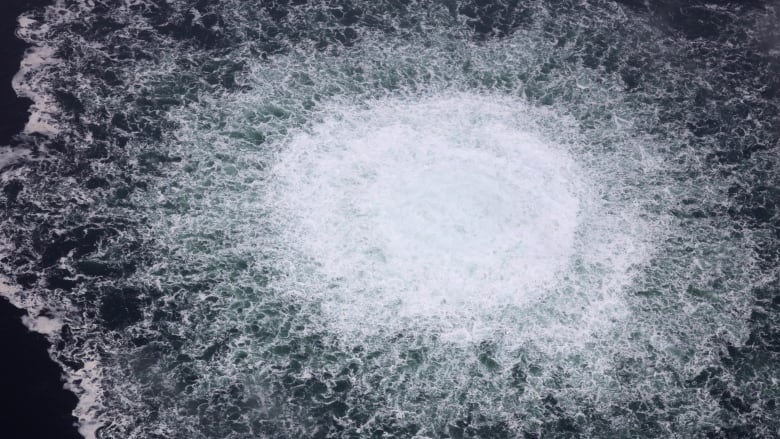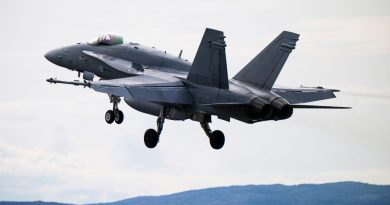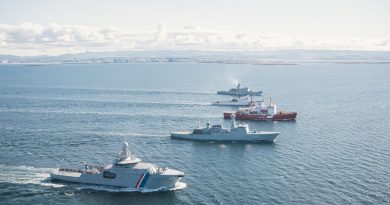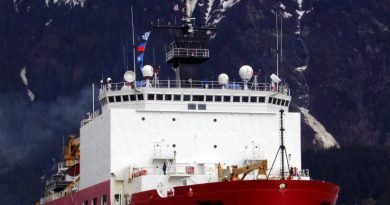Sweden confirms new leak in underwater Nord Stream gas pipelines

The Swedish Coast Guard on Thursday confirmed a fourth leak on the damaged Nord Stream natural gas pipelines, after ruptures reported earlier in the week.
“We have leakage at two positions” off Sweden, said Coast Guard spokesperson Mattias Lindholm. There are two more off Denmark, he said.
Two of the leaks are on the Nord Stream 1 pipeline, which recently stopped supplying gas, while the other two are on Nord Stream 2, which never started operating. Although they were not running, both pipelines were filled with gas, which has escaped and bubbled to the surface.
The pipelines run through the Baltic Sea to transport gas from Russia to Germany. The Danish and Swedish governments believe the leaks off their countries were “deliberate actions.”
“All available information indicates those leaks are the result of a deliberate act,” EU foreign policy chief Josep Borrell said in a statement Wednesday on behalf of the bloc’s 27 members.
Sweden’s Coast Guard said the latest leak was found on Nord Stream 2, very close to a larger leak found earlier on Nord Stream 1.
NATO on Thursday said it would retaliate for any attacks on the critical infrastructure in its 30 member countries as it suggested that damage to the underwater pipelines off Denmark and would-be member Sweden in international waters is the result of sabotage.
“Any deliberate attack against allies’ critical infrastructure would be met with a united and determined response,” NATO ambassadors said in a statement. They said that the damage to the pipelines “is of deep concern.”
Risk to shipping and climate
The alliance also said that “all currently available information indicates that this is the result of deliberate, reckless and irresponsible acts of sabotage. These leaks are causing risks to shipping and substantial environmental damage.”
Explosions were recorded before the leaks were reported. A first explosion was recorded by seismologists early Monday southeast of the Danish island of Bornholm. A second, stronger blast northeast of the island that night was equivalent to a magnitude-2.3 earthquake. Seismic stations in Denmark, Norway and Finland also registered the explosions.
Some European officials and energy experts have said Russia is likely to blame for any sabotage — it directly benefits from higher energy prices and economic anxiety across Europe — although others cautioned against pointing fingers until investigators are able to determine what happened.
Speaking Wednesday before the fourth leak was reported, Swedish Prime Minister Magdalena Andersson said it would have taken a large explosive device to cause the damage.
It’s believed the leaks have sent hundreds of thousands of tonnes of methane gas jetting to the surface and have left the pipes severely damaged, possibly permanently. Methane is a primary component of natural gas.
Kremlin calls it a ‘very dangerous situation’
In Moscow, Kremlin spokesperson Dmitry Peskov said Thursday that the Nord Stream pipeline incident would have been impossible without a state actor’s involvement.
“It looks like a terror attack, probably conducted on a state level,” Peskov said in a conference call with reporters.
“Judging by the amount of destruction of the Nord Stream, it’s hard to imagine that such action could have been taken without a state involvement,” Peskov said. “It’s a very dangerous situation that requires a quick investigation.”
He dismissed media reports about Russian warships spotted in the area as “stupid and biased,” adding that “many more aircraft and vessels belonging to NATO countries have been spotted in the area.”
Torben Jorgensen, a former admiral with the Danish navy, told The Associated Press that it was “not so demanding” to carry out an operation either by using a remotely operated underwater vehicle or sending divers from a submarine or a surface vessel.
With files from Reuters and CBC News
Related stories from around the North:
Canada: NATO chief tours Arctic defences as Canada comes under pressure, CBC News



